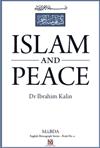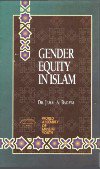كتاب Style of the Holy Quran An Analytical Study
The present article deals the most important criticism of the orientalists about Qur‟ān is that Muhammad Borrowed words and ideas from other religious scripture and civilization, Schematic form and multiple accounts in the Qur‟ān and the understanding of western scholar about the concept of the uses of Versification and the Preferences in Holy Qur‟ãn. The difference between is most prominent Versification or Monger verse, which is every thing in poetry. I have chosen the 06 aspects of the article of AL Kur‟ān written by A.T. Welch, which had been published in Encyclopedia of Islam in 1986. In which A.T. Welch has tried her best to create confusion through discussing controversies e.g. The Qur‟ãn is a miracle according to its grandeur message and delicacy and sweetness of tones. It has a source of the foundations of many languages and versification as well. The Qur‟ãn is such a poetic monument, which does not follow any poetic rule but gives the delight of the greatest poetry. Key Words: Foreign Vocabulary, Schematic, Multiple, Versification, Monger, Miracle, Language. 1.1 Foreign Vocabulary of the Holy Qur‟ān: In the earlier interpretation of the Qur‟ān, every aspect of Islamic literature has been discussed and mediated independently and keenly. There are a large number of sayings of the scholars about the non- Arabic words of the Qur‟ān. There are traditions of the interest of Hazrat Ibn e Abbās (RA) and his (RA) students in this regard. (1) The scholars of other religions and the experts of study of languages e.g., Imam Shaf ʿi (RA) (D 205 A.H.) took great interest in it i.e. This Qur‟ān is in pure Arabic and his rejection or denial also present of possibility of any non-Arabic vocabulary from foreign languages,(2) but the linguists like Abu Ubaida (D 224 A.H.), began to argue on the point that the vocabulary of other languages were included in the Qur‟ān.(3) Al-Tabrī (D 311 A.H.) advised to adopt the balanced ideology after mutual coordination that words of the other language were included in the Qur‟ān which were used in Arabic and other languages for communication. Abdul Rehman As-Tha‟lb (D 873 A.H.) has described the same thing in his Tafsīr „Al-Jawāhīr‟.(4) According to Al-Jāhīz (D 1905 A.H.), these words in the Qur‟ān and Arabic had been derived from ancient Arabic language which had trade and traveling relations with these languages and all these traditions are related with the period of Hazrat Muhammad (PBUH), other authors prefer the religious priorities on their own behalf.(5) Syūttī, (D 911 A.H.) has paid specific attention towards the non-Arabic words in his boo „Al-Itqān‟, and he made a separate chapter for the use of Hijāzī and non-Arabic language.(6) In the book of Syūttī „Al-Matawaklī‟, many terminologies have been divided separately, according to which, in the Qur‟ān, 3 words from African language, 3 from Persian language, 10 from Roman language, 3 from Hindi language, 16 from Syrian, 17 from Hebrew, 22 from Nabtī, 7 from Qubtī, 1 from Turkish language, 3 from Zanjī and 7 from Barbar are included.(7) يتناول هذا المقال أهم انتقادات المستشرقين للقرآن وهو محمد الكلمات والأفكار المستعارة من الكتب الدينية الأخرى والحضارة ، شكل تخطيطي ومتعدد الروايات القرآنية وفهم العلماء الغربيين لمفهوم استخدامات القصائد والمفضلات في القرآن الكريم ã. الفرق بين هو الأبرز قصيدة أو شعر منجر ، وهو كل شيء في الشعر. لقد اخترت الجوانب 06 من المقال القرعان بقلم أ. ولش ، الذي تم نشره في موسوعة الإسلام عام 1986 م أي. لقد بذلت ولش قصارى جهدها لإحداث ارتباك من خلال مناقشة الخلافات على سبيل المثال. القرآن هي معجزة برسالتها العظيمة ورقة النغمات وحلاوتها. لديها مصدر أسس العديد من اللغات والشعارات أيضًا. والقرآن مثل هذا الأثر الشعري الذي لا يتبع أي قاعدة شعرية بل يعطي بهجة أعظم الشعر. الكلمات المفتاحية: مفردات أجنبية ، تخطيطي ، تعدد ، تنوير ، منغر ، معجزة ، لغة. 1.1 المفردات الأجنبية للقرآن الكريم: في التفسير الأقدم للقرآن ، تمت مناقشة كل جانب من جوانب الأدب الإسلامي بوساطة مستقلة وحادة. هناك عدد كبير من أقوال العلماء عن غير كلمات عربية للقرآن. هناك تقاليد لمصلحة حضرة ابن عباس (رضي الله عنه) و (رضي الله عنه) الطلاب في هذا الصدد. (1) علماء الأديان الأخرى وخبراء دراسة اللغات مثل الإمام شافعي (رضي الله عنه) (ت 205 هـ) اهتم بها كثيرًا أي أن هذا القرآن مكتوب بالعربية الخالصة ورفضه أو رفضه. يوجد أيضًا إنكار لإمكانية وجود أي مفردات غير عربية من اللغات الأجنبية ، (2) لكن اللغويين مثل أبو عبيدة (ت 224 هـ) ، بدأ الجدال حول أن مفردات اللغات الأخرى كانت الواردة في القرآن الكريم (3). ونصح التبري (ت 311 هـ) بتبني الفكر المتوازن بعد المتبادل تنسيق أن كلمات اللغة الأخرى قد تم تضمينها في القرآن الكريم والتي كانت تستخدم في اللغة العربية و لغات أخرى للتواصل. وقد وصفه عبد الرحمن الثعب (ت 873 هـ) شيء في تفسيره “الجواهر”. [4) وبحسب الجاحظ (ت 1905 هـ) ، فإن هذه الكلمات في القرآن تن كانت اللغة العربية مشتقة من اللغة العربية القديمة التي كانت لها علاقات تجارية وسفر معها اللغات وجميع هذه التقاليد مرتبطة بفترة حضرة محمد (عليه الصلاة والسلام) ، والمؤلفين الآخرين يفضلون الأولويات الدينية نيابة عنهم. [5) سييتو (ت 911 هـ) اهتماما خاصا نحو الكلمات غير العربية في كتابه بوو "الإتقان" ، وقام بعمل فصل منفصل لاستخدام الحجازي. ولغة غير عربية. [6) في كتاب سيتو المتوكل ، تم تقسيم العديد من المصطلحات بشكل منفصل ، وفقًا لـ وهي في القرآن 3 كلمات من اللغة الأفريقية ، و 3 من اللغة الفارسية ، و 10 من اللغة الرومانية ، 3 من الهندية ، 16 من سوريا ، 17 من العبرية ، 22 من نبطي ، 7 من قبتي ، 1 من التركية لغة ، 3 من Zanjī و 7 من باربار مدرجة.-
من كتب اسلامية باللغة الانجليزية كتب إسلامية بلغات أخرى - مكتبة كتب إسلامية.

قراءة كتاب Style of the Holy Quran An Analytical Study أونلاين
معلومات عن كتاب Style of the Holy Quran An Analytical Study:
The present article deals the most important criticism of the orientalists about Qur‟ān is that Muhammad Borrowed words and ideas from other religious scripture and civilization, Schematic form and multiple accounts in the Qur‟ān and the understanding of western scholar about the concept of the uses of Versification and the Preferences in Holy Qur‟ãn. The difference between is most prominent Versification or Monger verse, which is every thing in poetry. I have chosen the 06 aspects of the article of AL Kur‟ān written by A.T. Welch, which had been published in Encyclopedia of Islam in 1986. In which A.T. Welch has tried her best to create confusion through discussing controversies e.g. The Qur‟ãn is a miracle according to its grandeur message and delicacy and sweetness of tones. It has a source of the foundations of many languages and versification as well. The Qur‟ãn is such a poetic monument, which does not follow any poetic rule but gives the delight of the greatest poetry. Key Words: Foreign Vocabulary, Schematic, Multiple, Versification, Monger, Miracle, Language. 1.1 Foreign Vocabulary of the Holy Qur‟ān: In the earlier interpretation of the Qur‟ān, every aspect of Islamic literature has been discussed and mediated independently and keenly. There are a large number of sayings of the scholars about the non- Arabic words of the Qur‟ān. There are traditions of the interest of Hazrat Ibn e Abbās (RA) and his (RA) students in this regard. (1) The scholars of other religions and the experts of study of languages e.g., Imam Shaf ʿi (RA) (D 205 A.H.) took great interest in it i.e. This Qur‟ān is in pure Arabic and his rejection or denial also present of possibility of any non-Arabic vocabulary from foreign languages,(2) but the linguists like Abu Ubaida (D 224 A.H.), began to argue on the point that the vocabulary of other languages were included in the Qur‟ān.(3) Al-Tabrī (D 311 A.H.) advised to adopt the balanced ideology after mutual coordination that words of the other language were included in the Qur‟ān which were used in Arabic and other languages for communication. Abdul Rehman As-Tha‟lb (D 873 A.H.) has described the same thing in his Tafsīr „Al-Jawāhīr‟.(4) According to Al-Jāhīz (D 1905 A.H.), these words in the Qur‟ān and Arabic had been derived from ancient Arabic language which had trade and traveling relations with these languages and all these traditions are related with the period of Hazrat Muhammad (PBUH), other authors prefer the religious priorities on their own behalf.(5) Syūttī, (D 911 A.H.) has paid specific attention towards the non-Arabic words in his boo „Al-Itqān‟, and he made a separate chapter for the use of Hijāzī and non-Arabic language.(6) In the book of Syūttī „Al-Matawaklī‟, many terminologies have been divided separately, according to which, in the Qur‟ān, 3 words from African language, 3 from Persian language, 10 from Roman language, 3 from Hindi language, 16 from Syrian, 17 from Hebrew, 22 from Nabtī, 7 from Qubtī, 1 from Turkish language, 3 from Zanjī and 7 from Barbar are included.(7)
يتناول هذا المقال أهم انتقادات المستشرقين للقرآن وهو محمد الكلمات والأفكار المستعارة من الكتب الدينية الأخرى والحضارة ، شكل تخطيطي ومتعدد الروايات القرآنية وفهم العلماء الغربيين لمفهوم استخدامات القصائد والمفضلات في القرآن الكريم ã. الفرق بين هو الأبرز قصيدة أو شعر منجر ، وهو كل شيء في الشعر. لقد اخترت الجوانب 06 من المقال القرعان بقلم أ. ولش ، الذي تم نشره في موسوعة الإسلام عام 1986 م أي. لقد بذلت ولش قصارى جهدها لإحداث ارتباك من خلال مناقشة الخلافات على سبيل المثال. القرآن هي معجزة برسالتها العظيمة ورقة النغمات وحلاوتها. لديها مصدر أسس العديد من اللغات والشعارات أيضًا. والقرآن مثل هذا الأثر الشعري الذي لا يتبع أي قاعدة شعرية بل يعطي بهجة أعظم الشعر. الكلمات المفتاحية: مفردات أجنبية ، تخطيطي ، تعدد ، تنوير ، منغر ، معجزة ، لغة. 1.1 المفردات الأجنبية للقرآن الكريم: في التفسير الأقدم للقرآن ، تمت مناقشة كل جانب من جوانب الأدب الإسلامي بوساطة مستقلة وحادة. هناك عدد كبير من أقوال العلماء عن غير كلمات عربية للقرآن. هناك تقاليد لمصلحة حضرة ابن عباس (رضي الله عنه) و (رضي الله عنه) الطلاب في هذا الصدد. (1) علماء الأديان الأخرى وخبراء دراسة اللغات مثل الإمام شافعي (رضي الله عنه) (ت 205 هـ) اهتم بها كثيرًا أي أن هذا القرآن مكتوب بالعربية الخالصة ورفضه أو رفضه. يوجد أيضًا إنكار لإمكانية وجود أي مفردات غير عربية من اللغات الأجنبية ، (2) لكن اللغويين مثل أبو عبيدة (ت 224 هـ) ، بدأ الجدال حول أن مفردات اللغات الأخرى كانت الواردة في القرآن الكريم (3). ونصح التبري (ت 311 هـ) بتبني الفكر المتوازن بعد المتبادل تنسيق أن كلمات اللغة الأخرى قد تم تضمينها في القرآن الكريم والتي كانت تستخدم في اللغة العربية و لغات أخرى للتواصل. وقد وصفه عبد الرحمن الثعب (ت 873 هـ) شيء في تفسيره “الجواهر”. [4) وبحسب الجاحظ (ت 1905 هـ) ، فإن هذه الكلمات في القرآن تن كانت اللغة العربية مشتقة من اللغة العربية القديمة التي كانت لها علاقات تجارية وسفر معها اللغات وجميع هذه التقاليد مرتبطة بفترة حضرة محمد (عليه الصلاة والسلام) ، والمؤلفين الآخرين يفضلون الأولويات الدينية نيابة عنهم. [5) سييتو (ت 911 هـ) اهتماما خاصا نحو الكلمات غير العربية في كتابه بوو "الإتقان" ، وقام بعمل فصل منفصل لاستخدام الحجازي. ولغة غير عربية. [6) في كتاب سيتو المتوكل ، تم تقسيم العديد من المصطلحات بشكل منفصل ، وفقًا لـ وهي في القرآن 3 كلمات من اللغة الأفريقية ، و 3 من اللغة الفارسية ، و 10 من اللغة الرومانية ، 3 من الهندية ، 16 من سوريا ، 17 من العبرية ، 22 من نبطي ، 7 من قبتي ، 1 من التركية لغة ، 3 من Zanjī و 7 من باربار مدرجة.
عدد مرات التحميل : 9355 مرّة / مرات.
تم اضافته في : الجمعة , 25 مارس 2016م.
حجم الكتاب عند التحميل : 430.1 كيلوبايت .
تعليقات ومناقشات حول الكتاب:
The present article deals the most important criticism of the orientalists about Qur‟ān is that Muhammad Borrowed words and ideas from other religious scripture and civilization, Schematic form and multiple accounts in the Qur‟ān and the understanding of western scholar about the concept of the uses of Versification and the Preferences in Holy Qur‟ãn. The difference between is most prominent Versification or Monger verse, which is every thing in poetry. I have chosen the 06 aspects of the article of AL Kur‟ān written by A.T. Welch, which had been published in Encyclopedia of Islam in 1986. In which A.T. Welch has tried her best to create confusion through discussing controversies e.g. The Qur‟ãn is a miracle according to its grandeur message and delicacy and sweetness of tones. It has a source of the foundations of many languages and versification as well. The Qur‟ãn is such a poetic monument, which does not follow any poetic rule but gives the delight of the greatest poetry. Key Words: Foreign Vocabulary, Schematic, Multiple, Versification, Monger, Miracle, Language. 1.1 Foreign Vocabulary of the Holy Qur‟ān: In the earlier interpretation of the Qur‟ān, every aspect of Islamic literature has been discussed and mediated independently and keenly. There are a large number of sayings of the scholars about the non- Arabic words of the Qur‟ān. There are traditions of the interest of Hazrat Ibn e Abbās (RA) and his (RA) students in this regard. (1) The scholars of other religions and the experts of study of languages e.g., Imam Shaf ʿi (RA) (D 205 A.H.) took great interest in it i.e. This Qur‟ān is in pure Arabic and his rejection or denial also present of possibility of any non-Arabic vocabulary from foreign languages,(2) but the linguists like Abu Ubaida (D 224 A.H.), began to argue on the point that the vocabulary of other languages were included in the Qur‟ān.(3) Al-Tabrī (D 311 A.H.) advised to adopt the balanced ideology after mutual coordination that words of the other language were included in the Qur‟ān which were used in Arabic and other languages for communication. Abdul Rehman As-Tha‟lb (D 873 A.H.) has described the same thing in his Tafsīr „Al-Jawāhīr‟.(4) According to Al-Jāhīz (D 1905 A.H.), these words in the Qur‟ān and Arabic had been derived from ancient Arabic language which had trade and traveling relations with these languages and all these traditions are related with the period of Hazrat Muhammad (PBUH), other authors prefer the religious priorities on their own behalf.(5) Syūttī, (D 911 A.H.) has paid specific attention towards the non-Arabic words in his boo „Al-Itqān‟, and he made a separate chapter for the use of Hijāzī and non-Arabic language.(6) In the book of Syūttī „Al-Matawaklī‟, many terminologies have been divided separately, according to which, in the Qur‟ān, 3 words from African language, 3 from Persian language, 10 from Roman language, 3 from Hindi language, 16 from Syrian, 17 from Hebrew, 22 from Nabtī, 7 from Qubtī, 1 from Turkish language, 3 from Zanjī and 7 from Barbar are included.(7)
يتناول هذا المقال أهم انتقادات المستشرقين للقرآن وهو محمد الكلمات والأفكار المستعارة من الكتب الدينية الأخرى والحضارة ، شكل تخطيطي ومتعدد الروايات القرآنية وفهم العلماء الغربيين لمفهوم استخدامات القصائد والمفضلات في القرآن الكريم ã. الفرق بين هو الأبرز قصيدة أو شعر منجر ، وهو كل شيء في الشعر. لقد اخترت الجوانب 06 من المقال القرعان بقلم أ. ولش ، الذي تم نشره في موسوعة الإسلام عام 1986 م أي. لقد بذلت ولش قصارى جهدها لإحداث ارتباك من خلال مناقشة الخلافات على سبيل المثال. القرآن هي معجزة برسالتها العظيمة ورقة النغمات وحلاوتها. لديها مصدر أسس العديد من اللغات والشعارات أيضًا. والقرآن مثل هذا الأثر الشعري الذي لا يتبع أي قاعدة شعرية بل يعطي بهجة أعظم الشعر. الكلمات المفتاحية: مفردات أجنبية ، تخطيطي ، تعدد ، تنوير ، منغر ، معجزة ، لغة. 1.1 المفردات الأجنبية للقرآن الكريم: في التفسير الأقدم للقرآن ، تمت مناقشة كل جانب من جوانب الأدب الإسلامي بوساطة مستقلة وحادة. هناك عدد كبير من أقوال العلماء عن غير كلمات عربية للقرآن. هناك تقاليد لمصلحة حضرة ابن عباس (رضي الله عنه) و (رضي الله عنه) الطلاب في هذا الصدد. (1) علماء الأديان الأخرى وخبراء دراسة اللغات مثل الإمام شافعي (رضي الله عنه) (ت 205 هـ) اهتم بها كثيرًا أي أن هذا القرآن مكتوب بالعربية الخالصة ورفضه أو رفضه. يوجد أيضًا إنكار لإمكانية وجود أي مفردات غير عربية من اللغات الأجنبية ، (2) لكن اللغويين مثل أبو عبيدة (ت 224 هـ) ، بدأ الجدال حول أن مفردات اللغات الأخرى كانت الواردة في القرآن الكريم (3). ونصح التبري (ت 311 هـ) بتبني الفكر المتوازن بعد المتبادل تنسيق أن كلمات اللغة الأخرى قد تم تضمينها في القرآن الكريم والتي كانت تستخدم في اللغة العربية و لغات أخرى للتواصل. وقد وصفه عبد الرحمن الثعب (ت 873 هـ) شيء في تفسيره “الجواهر”. [4) وبحسب الجاحظ (ت 1905 هـ) ، فإن هذه الكلمات في القرآن تن كانت اللغة العربية مشتقة من اللغة العربية القديمة التي كانت لها علاقات تجارية وسفر معها اللغات وجميع هذه التقاليد مرتبطة بفترة حضرة محمد (عليه الصلاة والسلام) ، والمؤلفين الآخرين يفضلون الأولويات الدينية نيابة عنهم. [5) سييتو (ت 911 هـ) اهتماما خاصا نحو الكلمات غير العربية في كتابه بوو "الإتقان" ، وقام بعمل فصل منفصل لاستخدام الحجازي. ولغة غير عربية. [6) في كتاب سيتو المتوكل ، تم تقسيم العديد من المصطلحات بشكل منفصل ، وفقًا لـ وهي في القرآن 3 كلمات من اللغة الأفريقية ، و 3 من اللغة الفارسية ، و 10 من اللغة الرومانية ، 3 من الهندية ، 16 من سوريا ، 17 من العبرية ، 22 من نبطي ، 7 من قبتي ، 1 من التركية لغة ، 3 من Zanjī و 7 من باربار مدرجة.
Style of the Holy Quran An Analytical Study من كتب إسلامية
 مهلاً !
مهلاً !قبل تحميل الكتاب .. يجب ان يتوفر لديكم برنامج تشغيل وقراءة ملفات pdf
يمكن تحميلة من هنا 'تحميل البرنامج'

نوع الكتاب : pdf.
اذا اعجبك الكتاب فضلاً اضغط على أعجبني و يمكنك تحميله من هنا:


كتب اخرى في كتب اسلامية باللغة الانجليزية
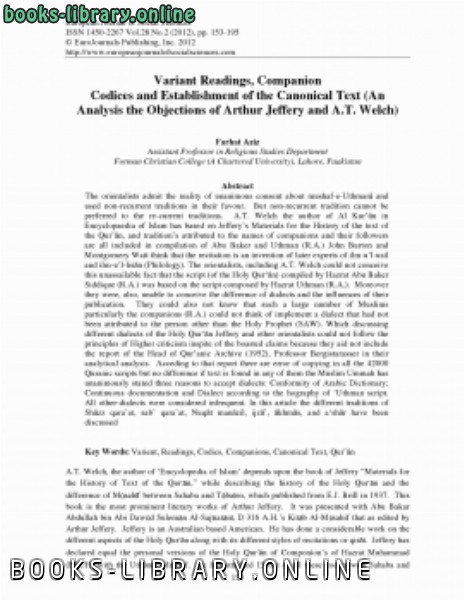
Variant Readings Companion Codices and Establishment of the Canonical Text An Analysis the Objections of Arthur Jeffery and A T Welch PDF
قراءة و تحميل كتاب Variant Readings Companion Codices and Establishment of the Canonical Text An Analysis the Objections of Arthur Jeffery and A T Welch PDF مجانا
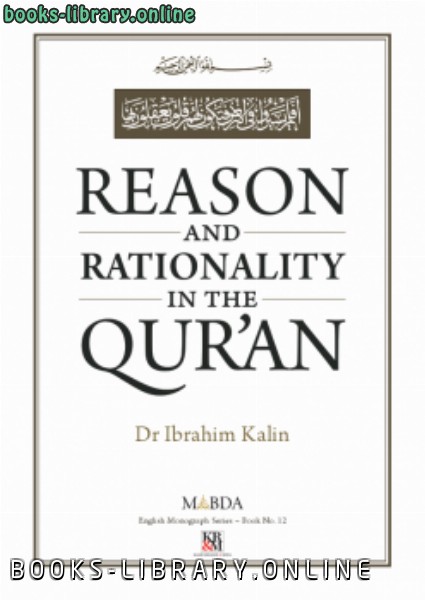
Reason and Rationality in the Qur’an PDF
قراءة و تحميل كتاب Reason and Rationality in the Qur’an PDF مجانا
رسالة عيسى عليه السلام الصحيحة The True Message Of Jesus Christ PDF
قراءة و تحميل كتاب رسالة عيسى عليه السلام الصحيحة The True Message Of Jesus Christ PDF مجانا
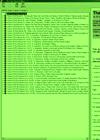
كتابات آباء الكنيسة The Early Church Fathers Series PDF
قراءة و تحميل كتاب كتابات آباء الكنيسة The Early Church Fathers Series PDF مجانا
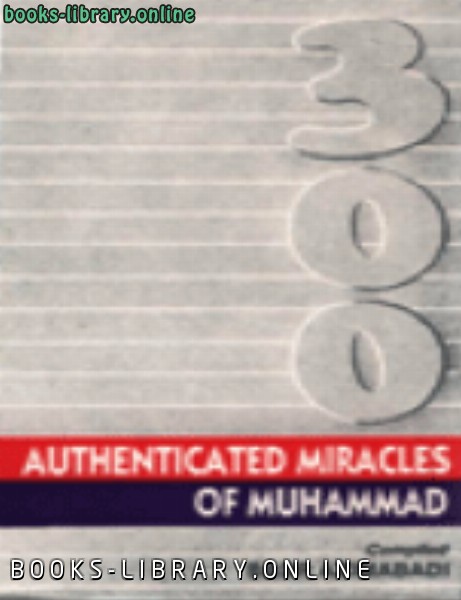
300 Authenticated Miracles of Muhammad p b u h PDF
قراءة و تحميل كتاب 300 Authenticated Miracles of Muhammad p b u h PDF مجانا

